Hey guys are you looking to build apps but don’t know coding, Don’t worry here is the best solution for you guys. here we have selected 10 Best No-Code App Builders to Help You Become a Millionaire without having any coding knowledge.
The rise of no-code platforms has democratized app development, allowing anyone to turn their ideas into fully functional applications without needing to write a single line of code. These tools have the potential to create successful businesses, and in this detailed blog post, we’ll explore 10 of the best no-code app builders that could help you become a millionaire.
| S.N | No code App Builder Name | Paid or Free | Paid plan start At |
|---|---|---|---|
| 1 | Bubble | Paid and free Both | $32 per month |
| 2 | Adalo | Paid and free Both | $45 Per Month |
| 3 | Glide Apps | Paid | $60 Per Month |
| 4 | App Gyver | Paid | Unknown |
| 5 | Appy Pie | Paid and free Both | $36 Per Month |
| 6 | Thunkable | Paid and free Both | $15 Per Month |
| 7 | Out Systems | Paid and free Both | $36300 Per Year |
| 8 | Kodular | Paid and free Both | $3.50 Per Month |
| 9 | Zoho Creator | Paid and free Both | $12 Per Month |
| 10 | AppHeet | Paid | $5 Per Month |
What is no code app builder?
No-code app builders allow users to create applications without writing any code. They are designed for people who may not have programming knowledge but still want to build functional apps for web, mobile, or other platforms. Here’s a review of no-code app builders based on their features, benefits, and potential limitations.
Key Features of No-Code App Builders
- Drag-and-Drop Interface: Most no-code platforms offer a visual editor where users can drag and drop components (like buttons, text boxes, images) to build their apps. This makes the development process more intuitive and accessible.
- Pre-built Templates and Components: These platforms usually provide a variety of pre-built templates and components, which can be customized to meet specific needs. This feature speeds up the development process.
- Integration with Third-Party Services: No-code app builders often integrate with various third-party services, such as payment gateways, databases, and APIs, allowing users to add complex functionality to their apps without coding.
- Responsive Design: Many no-code builders ensure that the apps created are responsive, meaning they work well on both desktop and mobile devices.
- User Management and Authentication: Some platforms provide built-in user management and authentication features, enabling app creators to add secure login functionalities easily.
- Data Handling and Backend Management: Users can manage data directly within the app builder, with some platforms offering robust database solutions or allowing connections to external databases.
- Publishing and Hosting: These platforms often provide one-click publishing and hosting options, making deploying apps directly from the builder environment easy.
Benefits of No-Code App Builders
- Accessibility: They open up app development to non-technical users, democratizing the creation of software and enabling more people to bring their ideas to life.
- Speed: Building an app using a no-code platform is typically much faster than traditional coding, as it eliminates the need to write and debug extensive lines of code.
- Cost-Effective: For many small businesses and startups, hiring a team of developers can be costly. No-code platforms reduce the cost of development by allowing a single individual to create a complete app.
- Flexibility and Iteration: The visual nature of no-code platforms allows for rapid prototyping and iteration. Changes can be made quickly and tested in real-time.
- Focus on Functionality: Because the technical complexities are managed by the platform, creators can focus more on the functionality and user experience of their app.
Limitations of No-Code App Builders
- Scalability Issues: No-code platforms might not be suitable for highly complex or large-scale applications that require custom backend architecture or heavy computational resources.
- Limited Customization: While these platforms offer a lot of flexibility, there are still limitations on what can be achieved without writing code. Some specific or unique functionalities may not be possible.
- Performance Concerns: Apps built on no-code platforms might have performance limitations, especially if they need to handle a large amount of data or complex operations.
- Dependency on the Platform: Using a no-code builder means relying on that platform for updates, maintenance, and support. If the platform has issues or discontinues, the app might face challenges.
- Security and Compliance: Handling sensitive data or building apps that need to comply with strict regulatory requirements (like HIPAA, and GDPR) can be challenging on no-code platforms due to limited control over backend and security configurations.
How no code app builder can make you a millionaire?
No-code app builders can be powerful tools for entrepreneurs and aspiring developers looking to create profitable businesses or apps without needing to learn traditional coding skills. Here’s how no-code app builders can potentially help someone become a millionaire
- Rapid Prototyping and Launch
- Cost-Effective Development
- Scaling a SaaS Business
- Creating MVPs for Fundraising
- Freelance and Agency Work
- Automation and Digital Products
10 best no-code app builder
1. Bubble
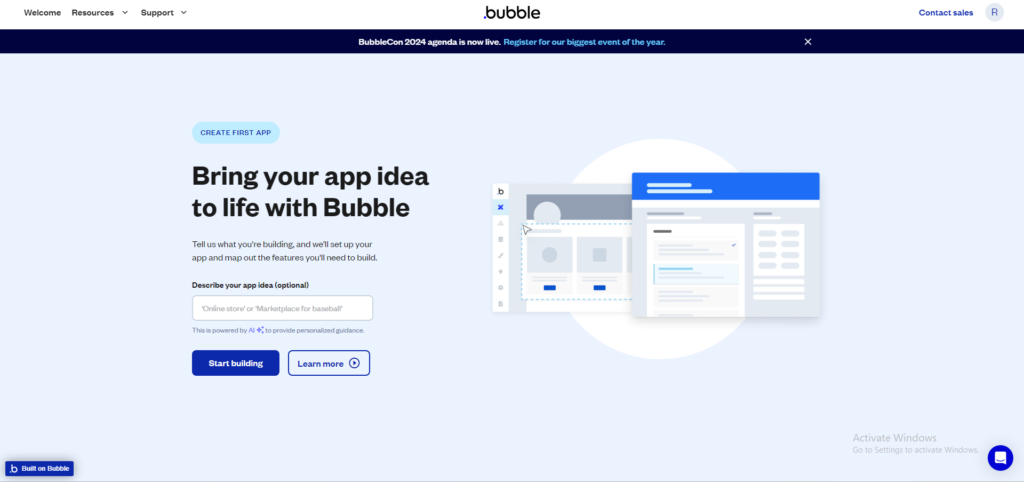
Bubble is one of the most versatile and powerful no-code platforms available today. It’s designed to help users build complex, data-driven web applications without needing to code. With Bubble, you can create everything from social networks and marketplaces to SaaS (Software as a Service) products.
Why It’s a Millionaire Maker: Bubble’s flexibility and comprehensive feature set make it a favorite among startups and entrepreneurs. Its ability to scale means that apps built on Bubble can grow alongside your business, allowing for long-term success and profitability. Notable companies, including Dividend Finance and Plato, started on Bubble and have grown into thriving businesses.
While Bubble is designed to be user-friendly, there is a learning curve. New users might find it easy to grasp the basics and start building quickly, but as they progress, they may encounter more complex challenges. These challenges often require users to dive deeper into Bubble’s functionalities or seek help from the community, forums, or tutorial videos. This learning process can be quite engaging and rewarding, as overcoming obstacles often leads to a stronger understanding of the platform and a sense of accomplishment.
Having personally used Bubble for several years, I’ve built six apps, each time refining my skills and learning new tricks. I even wrote a guide for the Zapier blog on creating a simple to-do list app using Bubble, which can be a great starting point for beginners.
One of Bubble’s greatest strengths is its active community. There is a wealth of resources available to help new users get started, from detailed video tutorials and written guides to introductory courses and bootcamps. For those who want to accelerate their learning, Bubble also offers coaching options.
Features:
- Visual Programming: Bubble’s drag-and-drop editor allows you to visually design your app’s interface and workflows.
- Custom Database: Manage data directly within Bubble, with powerful tools for creating custom data structures.
- API Integrations: Easily connect your app with external services and APIs to extend its functionality.
- Responsive Design: Build applications that work seamlessly on both desktop and mobile devices.
- Scalability: As your app grows, Bubble offers the infrastructure to handle increased traffic and data.
Use Cases:
- Building complex web applications like Airbnb or Uber.
- Creating SaaS platforms with subscription models.
- Developing custom marketplaces for niche products.
Pricing: Bubble offers a free plan with limited features, and paid plans start at $25 per month, with advanced options for scaling up.
| Plan | Monthly Billed | Annually Billed | Features |
|---|---|---|---|
| Free | $0 | $0 | 50k workload units/mo development version API Connector Component library 1 app editor |
| Starter | $32/Mo | $29/Mo | 175k workload units/mo Live app Custom domain Recurring workflows Basic version control |
| Growth | $134/Mo | $119/Mo | 250k workload units/mo 2 app editors Premium version control Two-factor authentication 10 custom branches |
| Team | $399/Mo | $349/Mo | 500k workload units/mo 5 app editorsSub apps 25 custom branches 20 days of server logs |
Is Bubble Right for You?
If you’re looking for an app builder that’s flexible and allows you to implement advanced logic, Bubble is a strong contender. It provides the tools to bring your digital product to life, although the journey might not be entirely smooth for beginners. However, with persistence, access to a supportive community, and the plethora of learning resources available, you’ll come out the other side with a robust app and the skills to continue improving it.
2. Adalo
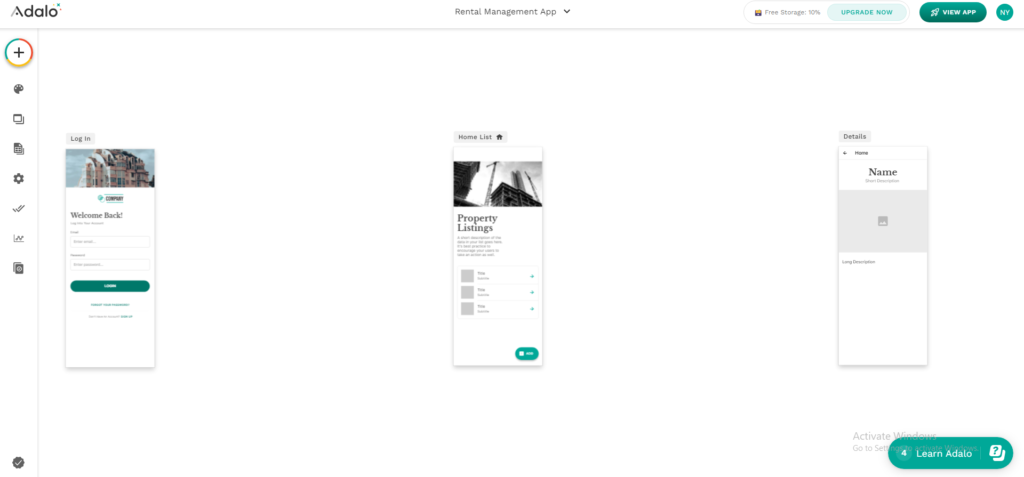
Adalo is a no-code platform focused on mobile app development. Its user-friendly interface allows anyone to create both web and native mobile applications. Adalo is perfect for entrepreneurs looking to quickly launch an MVP (Minimum Viable Product) or a fully-fledged app for both Android and iOS.
Why It’s a Millionaire Maker: Adalo’s emphasis on mobile app development makes it a strong contender for entrepreneurs aiming to capitalize on the booming mobile market. With its rapid development capabilities, you can quickly test ideas, iterate based on user feedback, and capture market share.
Features:
- Drag-and-Drop Builder: Design your app’s UI with an intuitive drag-and-drop editor.
- Pre-built Components: Utilize Adalo’s library of pre-built components like forms, lists, and buttons to speed up development.
- Custom Actions: Define custom workflows and interactions within your app.
- Real-Time Database: Sync data in real-time, ensuring that your app is always up-to-date.
- Multi-Platform Deployment: Publish your app to both the Apple App Store and Google Play Store with ease.
Use Cases:
- Developing mobile apps for startups and small businesses
- Creating MVPs for new app ideas.
- Building niche community apps or loyalty programs.
Pricing: Adalo offers a free plan with basic features, while paid plans start at $50 per month, offering more advanced functionalities and publishing options.
| Plan | Monthly Billed | Annually Billed | Features |
|---|---|---|---|
| Free | $0 | $0 | |
| Starter | $45/Mo | $36/Mo | |
| Professional | $65/Mo | $52/Mo | |
| Team | $200/Mo | $160/Mo | |
| Business | $250/Mo | $200/Mo | Unlimited App Editors |
3. Glide
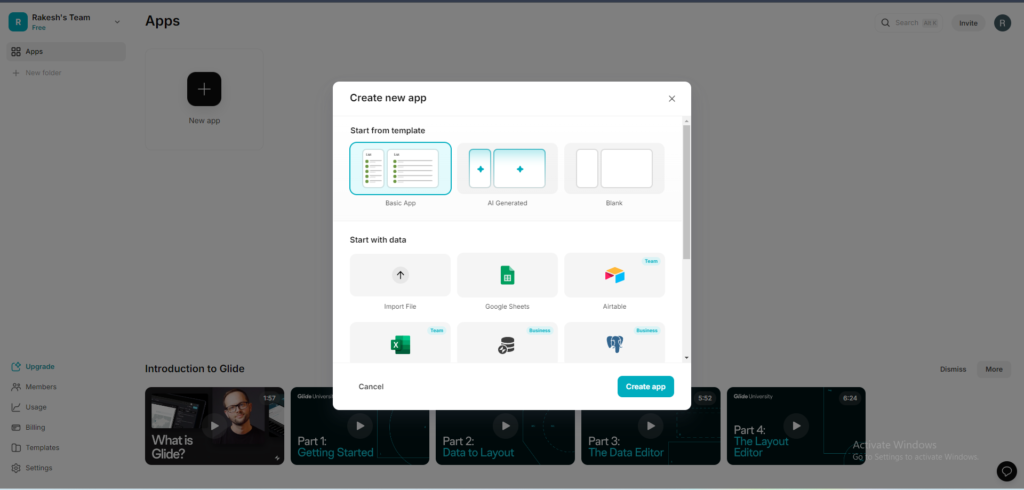
Overview: Glide transforms spreadsheets into beautiful, functional mobile apps. It’s perfect for users who are comfortable working with data in spreadsheets and want to create apps without learning how to code. Glide is known for its speed and simplicity, making it an excellent choice for launching apps quickly.
Why It’s a Millionaire Maker: Glide’s simplicity allows entrepreneurs to turn spreadsheet data into apps in a matter of minutes. This speed-to-market advantage can be crucial for validating ideas and capturing early adopters. Plus, its ability to handle real-time data makes it perfect for apps that require up-to-date information.
In Glide, each page of your app is referred to as a “tab.” Glide offers eight different layouts for these tabs, including options like swipe, checklist, or cards. These layouts dictate the overall look and feel of the app and provide built-in functionality, making it easy to create visually appealing apps with minimal effort. For users who want more control, the “details” layout allows for full customization of the tab’s structure, including adding components such as date pickers, buttons, and input fields. This flexibility is ideal for tailoring the app’s user interface (UI) to specific needs while maintaining a high level of design consistency.
One of the standout features of Glide is the ability to install the apps you create directly on your computer or mobile device with just a few clicks. This installation creates an icon on the home screen that, when clicked, launches the app as a Progressive Web App (PWA). PWAs run via the internet rather than being natively installed on the device, which makes them incredibly useful for testing, sharing, and distributing apps quickly and easily. For those looking to distribute their apps through official channels like the Apple App Store or Google Play, Glide offers a service to help prepare your app for the approval process.
Glide is particularly well-suited for creating marketplaces, directories, and simple mobile applications. An example is Telesomm, a marketplace built on Glide where sommeliers list their services, allowing enthusiasts to book sessions directly through the app. This app is optimized for mobile use and showcases Glide’s ability to create professional, user-friendly marketplaces with minimal development time.
Features:
- Spreadsheet-Based App Creation: Use Google Sheets or Excel to create and manage your app’s data
- Customizable Layouts: Choose from a variety of templates and layouts to design your app’s interface.
- Real-Time Updates: Any changes made in the spreadsheet are immediately reflected in the app.
- App Sharing: Easily share your app with others via a link, no app store approval required.
- No Coding Required: Build powerful apps without writing a single line of code.
Use Cases:
- Creating internal tools for business operations.
- Building apps for event management or inventory tracking.
- Developing customer-facing apps like directories or booking systems.
Pricing: Glide offers a free plan with limited features, while paid plans start at $25 per month, providing more customization and storage options.


4. AppGyver

Overview: AppGyver is a no-code platform that enables users to create sophisticated applications for both web and mobile. It’s known for its Composer Pro, a powerful visual builder that allows for extensive customization and fine-tuning of your app’s design and functionality.
Why It’s a Millionaire Maker: AppGyver is an excellent choice for entrepreneurs who need a high degree of control over their app’s design and logic. Its ability to create complex apps without code means you can develop unique, market-ready solutions that stand out in a crowded market.
Features:
- Composer Pro: A visual editor that allows you to create highly customized apps with pixel-perfect precision.
- Logic Flows: Build complex logic and workflows visually, without needing to write code.
- Multi-Platform Support: Develop apps for both web and mobile platforms simultaneously.
- Data Integration: Easily connect your app to external APIs and databases.
- Community and Support: Access a vibrant community and extensive documentation to help you along the way.
Use Cases:
- Developing custom business tools that require advanced functionality.
- Creating unique customer-facing apps with intricate workflows.
- Building web and mobile apps that require seamless integration with other systems.
Pricing: AppGyver offers a free plan with all features included, making it an incredibly attractive option for startups and individual developers.
5. Appy Pie
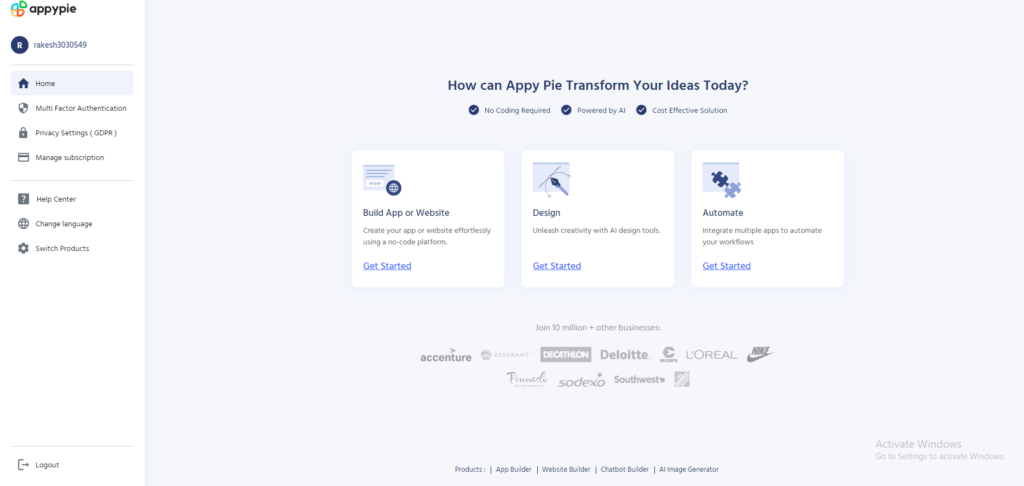
Overview: Appy Pie is a versatile no-code platform that allows users to create a wide range of digital products, including mobile apps, websites, chatbots, and more. It’s designed to be user-friendly, making it accessible to individuals and businesses of all sizes.
Why It’s a Millionaire Maker: Appy Pie’s extensive range of functionalities enables entrepreneurs to experiment with various app ideas, from eCommerce and booking apps to games and educational tools. This versatility increases the chances of finding a profitable niche and scaling your business.
Key Features:
- Wide Range of Digital Products: Appy Pie allows users to build not just mobile apps, but also websites, chatbots, and other digital solutions. This versatility makes it a one-stop-shop for businesses and individuals looking to create a cohesive digital presence.
- Intuitive Drag-and-Drop Interface: The platform’s drag-and-drop builder simplifies the app creation process. Users can easily add various elements, such as text, images, videos, buttons, and forms, directly onto their app or website. This eliminates the need for any coding knowledge, making it accessible for beginners.
- Multiple App Categories: Appy Pie supports a wide range of app categories, including e-commerce, restaurant, education, fitness, and more. The platform offers specific features and templates tailored to each category, allowing users to create niche-specific apps that meet their business needs.
- Native App Development: Apps created with Appy Pie are built to run natively on both iOS and Android platforms. This ensures a smooth user experience and broad reach across different devices and operating systems.
- Offline Capabilities: One of the standout features of Appy Pie is its ability to create apps that function offline. This is particularly useful for businesses whose users might have limited internet access or need to access app content without connectivity.
- Integration with Popular Third-Party Services: Appy Pie supports integration with a variety of third-party services, such as Google Drive, Dropbox, Slack, and more. These integrations enhance the functionality of the app, enabling features like cloud storage, automated workflows, and enhanced communication.
- App Monetization Options: Appy Pie provides several monetization options, including in-app purchases, ads, and subscriptions. This makes it easy for businesses to generate revenue from their apps.
- AI and Automation Features: Appy Pie incorporates AI-powered features that enable users to create chatbots and automate workflows. This helps businesses improve customer engagement and streamline operations without the need for additional tools.
Use Cases:
- Small Businesses and Startups: Small businesses and startups can use Appy Pie to create cost-effective digital solutions, such as apps and websites, to promote their services, sell products, or engage with customers. For instance, a local restaurant can build a food ordering app, or a fitness trainer can create a workout app with tutorials and scheduling features.
- Enterprises and Organizations: Larger enterprises can leverage Appy Pie to develop internal tools, such as employee management systems, project tracking apps, or event management platforms, without needing to invest heavily in development resources.
- Nonprofits and Community Groups: Nonprofits and community groups can create apps to facilitate community engagement, share information, and organize events. This enables them to reach their audience more effectively and at a lower cost.
- Education and Training Providers: Educational institutions and training providers can build apps for e-learning, providing students with access to courses, quizzes, and learning materials in a mobile-friendly format.
Pricing: Appy Pie offers a free trial, with paid plans starting at $18 per month for mobile apps and $36 per month for advanced features.
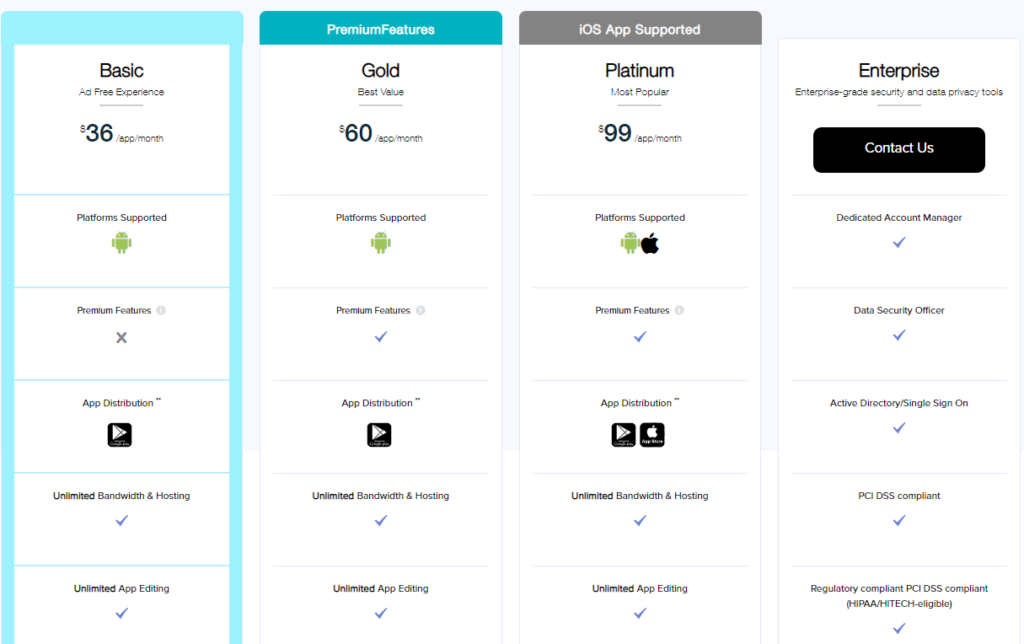
6. Thunkable
Overview: Thunkable is a no-code platform that allows users to create native mobile apps for both Android and iOS. It offers a drag-and-drop interface, making it easy for anyone to design and develop apps. Thunkable is particularly popular among educators and beginners due to its simplicity and ease of use.
Why It’s a Millionaire Maker: Thunkable’s cross-platform capabilities mean you can reach a broader audience by launching apps on both major mobile platforms simultaneously. This broad reach, combined with the ability to monetize through ads and in-app purchases, makes Thunkable a strong contender for building profitable apps.
Features:
- Drag-and-Drop Interface: Thunkable’s user interface is based on a drag-and-drop editor, making it easy for users to build and customize their apps visually. This approach eliminates the need for traditional coding, allowing users to focus on designing the user experience and functionality.
- Cross-Platform Development: One of Thunkable’s standout features is its ability to develop apps that are compatible with both Android and iOS from a single codebase. This means you only need to build your app once, and Thunkable will ensure it works seamlessly across both platforms, saving time and resources.
- Real-Time Preview: Thunkable provides a real-time preview of your app, allowing you to test changes instantly as you build. This feature speeds up the development process and helps ensure your app looks and functions as expected on different devices.
- Extensive Component Library: The platform offers a wide range of pre-built components, such as buttons, text fields, images, maps, and animations, which can be easily added to your app. Additionally, Thunkable supports advanced components like APIs, databases, and cloud storage, enabling you to build feature-rich apps with ease.
- Logic Blocks for App Functionality: Instead of writing code, Thunkable uses a block-based programming approach, similar to Scratch or MIT App Inventor, to define app logic. Users can create complex functionalities by connecting different logic blocks, such as “if-then” statements, loops, and variables. This makes it easier for beginners to grasp programming concepts without needing to learn a programming language.
- Third-Party Integrations: Thunkable supports integration with various third-party services, such as Google Sheets, Firebase, Airtable, and REST APIs. These integrations allow users to connect their apps to external data sources, enhance functionality, and automate workflows.
- Responsive Design: Thunkable’s design interface is built with responsiveness in mind, ensuring that your app adapts to different screen sizes and orientations. This is particularly important for creating a consistent user experience across various devices.
- Community and Support: Thunkable boasts an active community of users and developers who share tips, tutorials, and templates. The platform also provides a variety of learning resources, including documentation, video tutorials, and webinars, to help users get started and improve their skills.
Use Cases:
- Education Apps: Educators and students can use Thunkable to create interactive learning tools, quizzes, and educational games. The platform’s simplicity makes it ideal for introducing coding concepts to beginners.
- Business Apps: Small businesses and startups can build custom apps for managing inventory, tracking sales, or engaging with customers. Thunkable’s integrations with Google Sheets and Airtable make it easy to manage and visualize data within the app.
- Social and Community Apps: Thunkable is a great tool for creating community-focused apps, such as local event organizers, neighborhood groups, or hobby clubs. The platform’s integration capabilities allow for dynamic content updates and user engagement features.
- Prototyping and MVP Development: For startups and developers looking to quickly prototype an app or create a minimum viable product (MVP), Thunkable provides the necessary tools to build a fully functional prototype in a short amount of time
Pricing: Thunkable offers a free plan with limited features, while paid plans start at $13 per month, providing access to more advanced functionalities and publishing options.
| Plan | Monthly Billed | Annually Billed | Features |
|---|---|---|---|
| Free | $0 | $0 | |
| Starter | $15/Mo | $13/Mo | |
| Pro | $45/Mo | $38/Mo | Up to 50 private projects |
| Team | $500/Mo | $500/Mo | Custom Branding |
| Business | $200/Mo | $167/Mo |
7. OutSystems
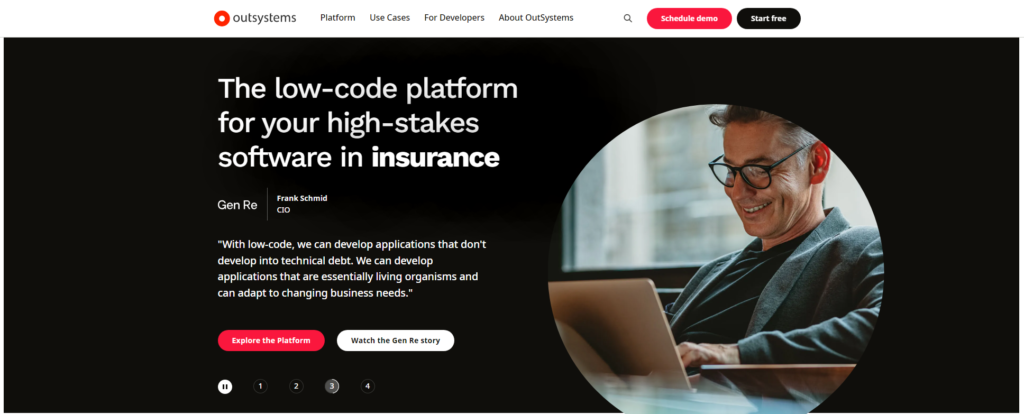
Overview: OutSystems is a robust low-code platform designed for building enterprise-grade applications. While it does require some coding knowledge, it offers significant flexibility and scalability, making it suitable for creating complex apps that can grow with your business.
Why It’s a Millionaire Maker: OutSystems is ideal for entrepreneurs looking to build high-performance apps that require custom coding and deep integrations. Its enterprise-level capabilities make it possible to create apps that can handle large-scale operations, ensuring long-term growth and profitability.
Features:
- Visual Development Environment: OutSystems provides a visual development environment where users can design user interfaces, workflows, and data models using a drag-and-drop interface. This allows for rapid prototyping and development, making it easier to visualize the app’s structure and flow without diving deep into code.
- Full-Stack Development: Unlike many low-code platforms that focus solely on front-end development, OutSystems supports full-stack development, allowing users to build both front-end and back-end components. This includes database management, server-side logic, APIs, and integrations, providing a comprehensive environment for building complete applications.
- AI-Powered Development Tools: OutSystems incorporates artificial intelligence (AI) to assist developers in various stages of app development. Features such as AI-driven suggestions, automated refactoring, and performance monitoring help optimize code, improve app performance, and reduce errors.
- Integration Capabilities: OutSystems offers robust integration capabilities with numerous third-party systems, databases, and enterprise software, such as SAP, Salesforce, and Microsoft Dynamics. It also provides REST and SOAP API integration, allowing businesses to connect their apps with existing systems seamlessly.
- Scalability and Performance: OutSystems is built to handle enterprise-scale applications, supporting thousands of users and large data volumes. The platform allows developers to build applications that can scale horizontally and vertically, ensuring high performance and reliability as usage grows.
- Deployment Flexibility: OutSystems provides flexible deployment options, supporting cloud, on-premises, or hybrid environments. This flexibility allows businesses to choose the deployment model that best fits their needs, whether for data security, compliance, or infrastructure requirements.
- Security and Compliance: Security is a core focus of OutSystems. The platform is designed with built-in security features, including data encryption, multi-factor authentication, and role-based access controls. It also complies with industry standards and regulations such as GDPR, HIPAA, and ISO 27001, making it suitable for highly regulated industries.
- Extensive Learning Resources and Community: OutSystems offers a rich set of learning resources, including tutorials, webinars, documentation, and a comprehensive training academy. Additionally, the OutSystems community is active and vibrant, providing forums, user groups, and a marketplace for sharing components and templates.
Use Cases:
- Enterprise Applications: Large enterprises use OutSystems to build mission-critical applications that require high performance, scalability, and security. This includes customer relationship management (CRM) systems, enterprise resource planning (ERP) tools, human resources management systems (HRMS), and more.
- Legacy System Modernization: Organizations looking to modernize their legacy systems and integrate them with modern technologies can leverage OutSystems to rebuild and enhance outdated software, ensuring better performance, scalability, and user experience.
- Customer-Facing Applications: OutSystems is also ideal for creating customer-facing applications, such as mobile apps, customer portals, and self-service platforms, that require a high level of usability, responsiveness, and integration with back-end systems.
- Internal Business Tools: Businesses often use OutSystems to build internal tools such as dashboards, inventory management systems, project management apps, and workflow automation tools, enabling more efficient operations and better data management.
Pricing: OutSystems offers a free trial, with paid plans starting at $4,000 per month, making it a significant investment but one that could pay off with the right application.
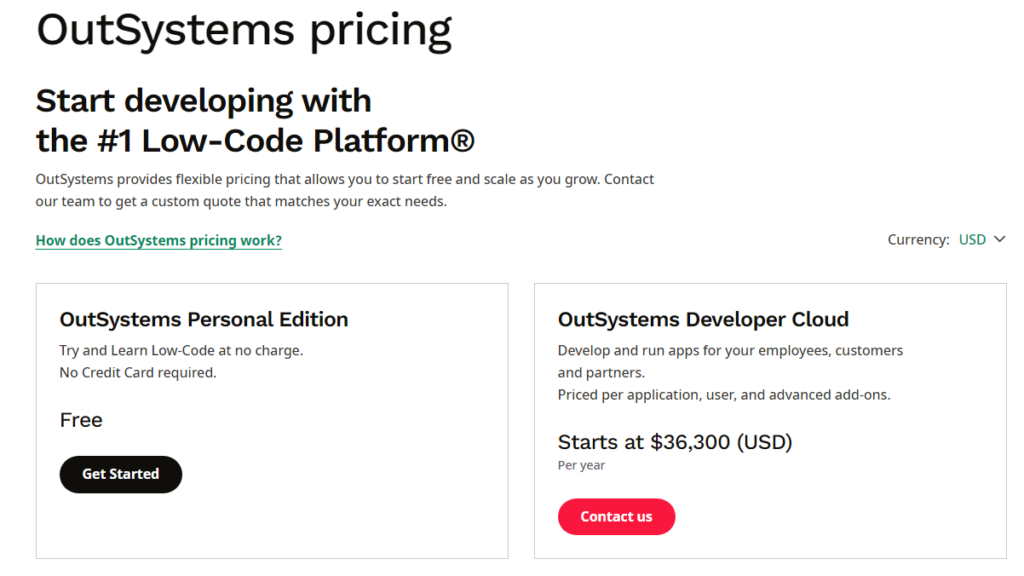
8. Kodular

Overview: Kodular is a no-code platform focused on building Android apps. It’s designed to be simple enough for beginners but powerful enough to create fully functional apps. Kodular’s visual editor and extensive component library make it easy to bring your app ideas to life.
Why It’s a Millionaire Maker: Kodular’s focus on Android, the world’s most popular mobile operating system, allows you to tap into a massive user base. With built-in monetization tools, you can start generating revenue from your app right away, making it a strong choice for aspiring app entrepreneurs.
Features:
- Visual Drag-and-Drop Interface: Kodular’s intuitive interface allows users to build apps by dragging and dropping components onto a canvas. This visual approach eliminates the need for traditional coding, making it accessible to users with no programming experience.
- Block-Based Programming: Kodular uses a block-based programming environment similar to MIT App Inventor and Scratch. Users can create complex app logic by connecting predefined code blocks that represent different functions, such as loops, conditions, and variables. This approach simplifies the app development process, making it easier to understand and implement complex functionalities.
- Extensive Component Library: The platform offers a wide range of built-in components, including buttons, text fields, images, videos, maps, sensors, and more. Users can easily add these components to their apps to create interactive and engaging user interfaces. Kodular also supports advanced components like Firebase, AdMob, and custom APIs for added functionality.
- Built-In Monetization Tools: Kodular provides several monetization options, allowing users to generate revenue from their apps. The platform supports AdMob, Facebook Ads, and other ad networks, enabling users to display ads within their apps. Users can also implement in-app purchases and subscriptions to monetize their apps further.
- Real-Time Testing and Debugging: Kodular allows users to test their apps in real time using the Kodular Companion app, which mirrors changes made in the builder. This feature helps users quickly identify and fix bugs, ensuring a smoother development process and a more stable final product.
- Responsive Design: Kodular supports responsive design, enabling users to create apps that look good and function well across various Android devices and screen sizes. This ensures a consistent user experience, regardless of the device being used.
- Community and Support: Kodular has a vibrant community of users and developers who share knowledge, tutorials, and tips. The platform also offers comprehensive documentation, video tutorials, and a forum where users can ask questions and get help from the community and the Kodular team.
- Integration with Third-Party Services: Kodular integrates with several third-party services, such as Firebase for backend services, Google Maps for location-based apps, and REST APIs for connecting to external data sources. This allows users to build more dynamic and data-driven applications.
Use Cases:
- Building simple games with ad-based revenue.
- Creating utility apps for personal use or the Google Play Store.
- Developing educational apps for students and teachers.
Pricing: Kodular is free to use, with monetization options available to help you generate revenue from your app.
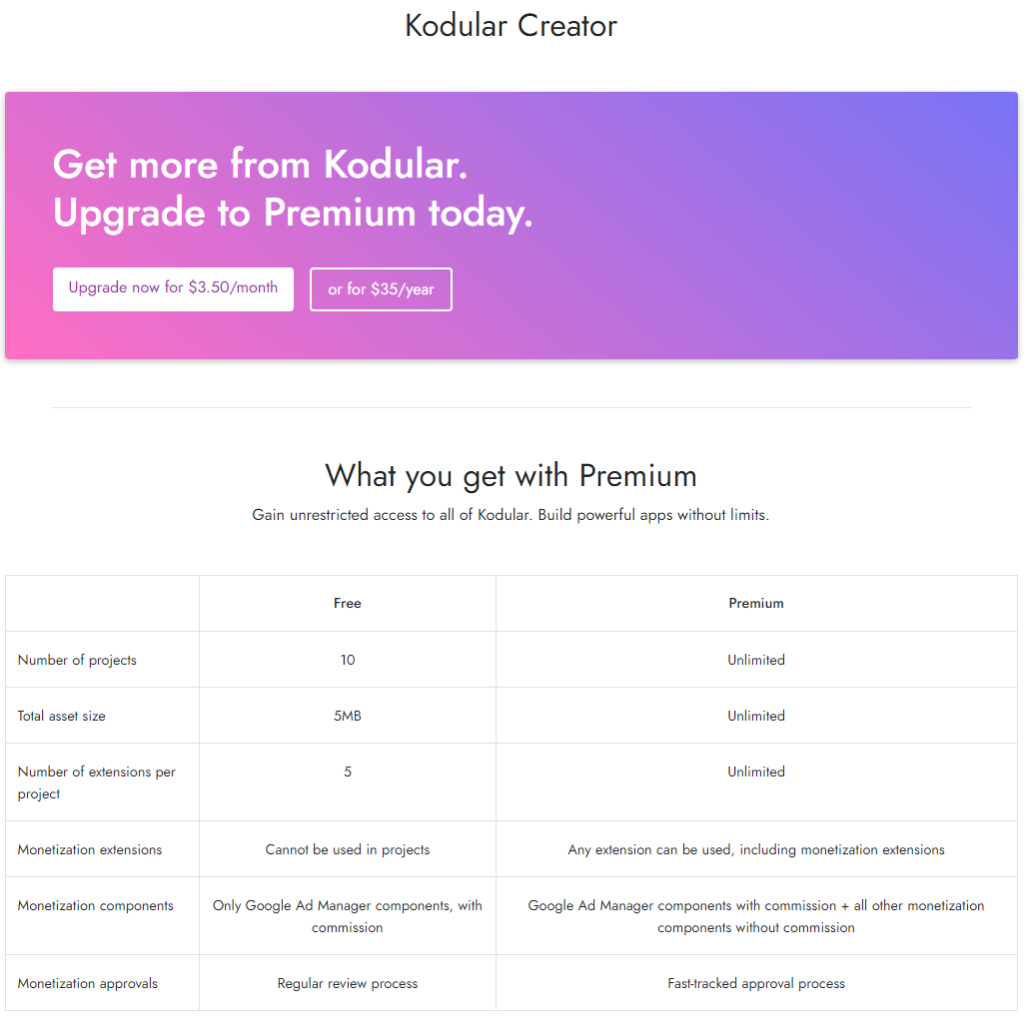
9. Zoho Creator
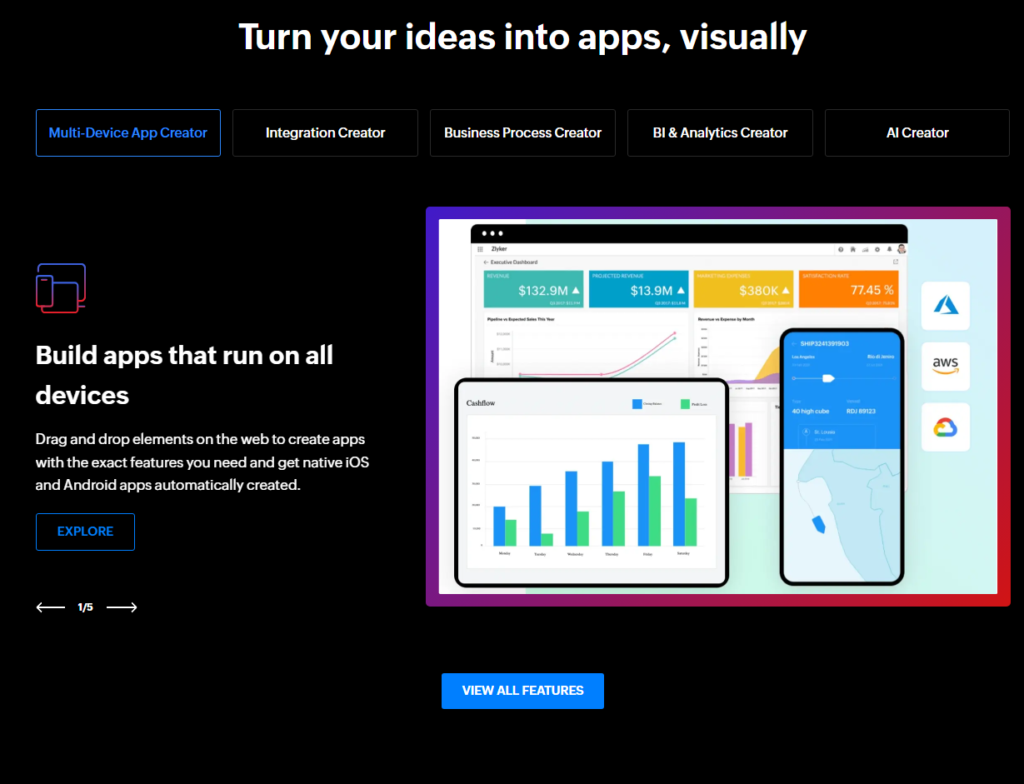
Overview: Zoho Creator is a low-code platform that enables users to build custom apps for various business needs. As part of the Zoho suite of products, it seamlessly integrates with other Zoho tools, making it ideal for businesses that already use Zoho’s ecosystem.
Why It’s a Millionaire Maker: Zoho Creator is perfect for entrepreneurs and businesses looking to create custom solutions without starting from scratch. Whether you’re automating workflows, managing data, or building a client-facing app, Zoho Creator’s flexibility and integrations make it a powerful tool for driving business success.
Features:
- Custom Workflows: Design workflows that automate tasks and improve efficiency.
- AI and ML Integration: Enhance your app with AI-driven features like predictive analytics and natural language processing.
- Extensive Reporting Tools: Generate detailed reports and dashboards to monitor app performance.
- Seamless Integration: Connect with other Zoho products like CRM, Books, and Desk for a unified business solution.
- Collaboration Features: Work with your team in real-time, with tools for communication and document sharing.
Use Cases:
- Building custom CRM systems tailored to your business needs.
- Creating internal tools for task management and workflow automation.
- Developing apps for client interaction and service management.
Pricing: Zoho Creator offers a free plan with limited features, while paid plans start at $10 per user per month, providing more advanced options and support.

10. AppSheet

Overview: AppSheet, now a part of Google Cloud, allows users to create mobile and web apps directly from their data sources, such as Google Sheets, Excel, and other cloud-based databases. It’s designed for businesses and individuals who need to turn their data into functional apps quickly and without coding.
Why It’s a Millionaire Maker: AppSheet’s integration with Google Cloud makes it a powerful tool for creating data-driven apps that can scale with your business. Whether you’re building a simple tool for internal use or a customer-facing app, AppSheet’s ease of use and powerful features make it a top choice for entrepreneurs.
Features:
- Data-Driven App Creation: Build apps directly from your existing data sources, with no need for manual data entry.
- Workflow Automation: Automate tasks and processes based on triggers and conditions within your app.
- Multi-Platform Support: Deploy your app across web and mobile platforms simultaneously.
- AI-Powered Functionality: Leverage AI to enhance your app’s features, such as predictive analytics and data categorization.
- Custom Branding: Customize the look and feel of your app to match your brand.
Use Cases:
- Creating field service apps for tracking and managing work orders.
- Developing inventory management systems for small businesses.
- Building customer-facing apps for booking, scheduling, or service management.
Pricing: AppSheet offers a free plan with basic features, while paid plans start at $5 per user per month, making it an affordable option for businesses of all sizes.
| Plan | Monthly Billed | Annually Billed | Features |
|---|---|---|---|
| Starter | $5/Mo | $5/Mo | |
| Core | $10/Mo | $10/Mo | |
| Enterprise Plus | $20/Mo | $20/Mo |
Conclusion
The no-code revolution has made it easier than ever for anyone to turn their app ideas into reality. Whether you’re an entrepreneur with a million-dollar idea or a business looking to streamline operations, these no-code app builders offer the tools and flexibility you need to succeed. By choosing the right platform for your needs and putting in the effort to create a high-quality app, you could be on your way to becoming the next app millionaire. So, don’t wait—start building today!

